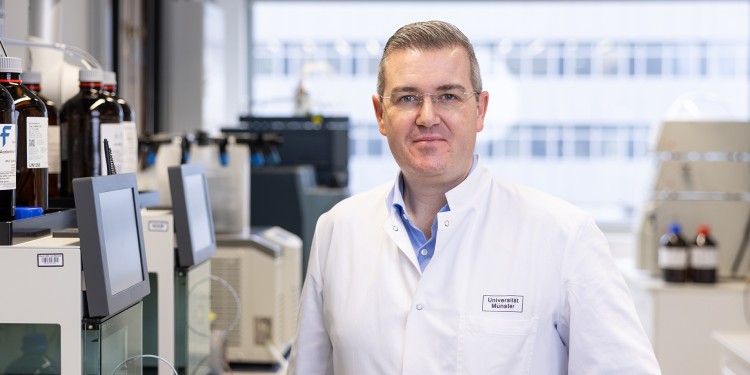ERC Proof of Concept Grants at the University of Münster
The Proof of Concept Grant allows researchers who have already received an ERC grant to explore the commercial or societal potential of their pioneering research project.

The Proof of Concept Grant allows researchers who have already received an ERC grant to explore the commercial or societal potential of their pioneering research project.

Funding period
2024–2025
Abstract
Fluorinated motifs have enormous societal relevance due to their ubiquity across the pharmaceutical, agrochemical and materials science sectors. These essential structural components feature prominently in the World Health Organization’s (WHO) list of essential medicines, and contribute to global food supplies by optimising the performance of many key agrochemicals. Similarly, our reliance on (polyfluorinated) materials ranging from non-stick Teflon® through to smart materials underscores the versatility of fluorinated groups in functional small molecule design. The historic success of fluorinated groups in societally-important molecules, coupled with scarcity of organofluorine building blocks in nature, continues to create a powerful impetus to develop more efficient and sustainable methods to facilitate their construction. However, the environmental impact of perfluorinated materials has come under scrutiny due to the persistence of the materials in the environment. The recent proposal by the European Parliament to address the persistence of perfluoroalkyl and polyfluoroalkyl (PFAS-type molecules) in water supplies covers "any substance that contains at least one fully fluorinated methyl (CF3) or methylene (CF2) without any H, Cl, Br, or I attached to it." Fluorinated groups that simultaneously conform to new legislative guidance, no longer pose an environmental threat and open up new areas of space for discovery will be generated efficiently. Through the intervention of ChiroFluor, unique structural entities such as the BITE group will be forged in both enantiomeric forms (handedness) to push chemical space beyond the existing boundaries. This project will simultaneously address a pressing environmental and legislative issue in a sustainable manner using an organocatalytic I(I)/I(III) platform based on data generated in ERC Consolidator RECON (818949), and validated with key industrial partners.
Funding period
2022–2023
Abstract
Messenger RNAs (mRNAs) have recently entered the stage as therapeutic modality. Examples are the mRNA-based vaccines against infection by SARS-Cov2. Hundreds of research groups in academia and industry aim to better understand the multiplicity of the mRNA technology and its possible applications. However, at present researchers are unable to control when and where the mRNA is translated into proteins – which then have a pharmacological effect. This is a bottleneck that severely limits the research needed to further develop mRNA as a therapeutic modality. We present FlashCaps, the first applicable solution that allows mRNA studies to be driven by light without altering the structure or sequence of the natural mRNA. Light is an excellent external control element that can be applied with high precision in space and time and without interfering with cellular processes. FlashCaps prevent the translation of the mRNA until activated by light. FlashCaps are compatible with all standard mRNA production and application procedures and thus of interest to all research groups and companies working on mRNA to date. In this proof of concept, we will determine the innovation potential of FlashCaps with a team of highly qualified scientists and innovation managers. Technological research to ensure reproducibility, stability, scalability, and quality of FlashCaps will be performed. User-friendly applicability of FlashCaps is achieved through the involvement of beta-testers. Innovation management research, including market analyses, data analytics and consumer interviews, is conducted to define the potential customers and their needs, to analyse the market potential and to investigate our competitors. Based on the research results and the agile exchange between the technological and innovation management research, we will decide on the best way of knowledge transfer to make FlashCaps available to the growing number of mRNA researchers.
Last updated: 02/2025